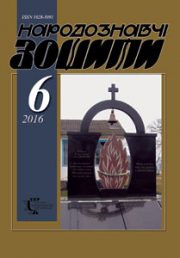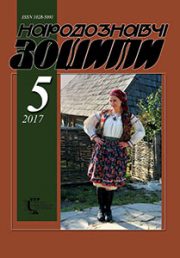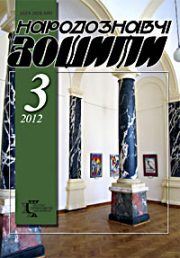The Ethnology Notebooks. 2024. № 2 (176), 346—358
UDK 392.8(=161.2:477.4):638.16
DOI https://doi.org/10.15407/nz2024.02.346
DMYTRENKO Alla
- ORCID ID: https://orcid.org/0000-0001-6125-8628
- Candidate of Historical Sciences,
- Associate Professor of the Department of Museum Studies,
- Monument Studies and information and analytical activities,
- Lesya Ukrainka Volyn National University;
- Researcher, State Research Center for the Protection
- of Cultural Heritage from Man-caused Disasters,
- 13 Voli Avenue, 43025, Lutsk, Ukraine,
- Contacts: e-mail: dmytrenko.a@gmail.com
Abstract. Based on the expedition materials collected during the historical and ethnographic expeditions of the State Scientific Center for the Protection of Cultural Heritage from Man-caused Disasters and the Department of Museum Studies, Monument Studies and Information and Analytical Activities of Lesya Ukrainka Volyn National University (2005—2023), the article highlights the traditions associated with honey selection in the Right-Bank Polissya of Ukraine.
The purpose of the article is to explore the essence of the custom of treating newly harvested honey, which is typical for forest beekeeping (board and log) and its current state, including in-frame beekeeping; find out the origins of this custom and its roots, to examine the essence of the term «bond» mentioned in the works of O. Serzhputovsky and M. Hrushevsky and to find out its origin. Analyze the peculiarities of treating newly collected honey in different villages of Right-Bank of Polissya. To note the existence of the custom of treating with novelty, especially caught fish, picked berries, fresh meat and lard, milk, etc. in different regions of Ukraine and its preservation to this day. The object of the study is the custom of treating people with newly harvested honey, which is characteristic of different forms of beekeeping: forest (beehive and log) and home (log and frame). The subject of the research is the origins and peculiarities of the custom of treating with newly harvested honey in forest and home beekeeping and its ethno-cultural parallels; peculiarities of treating children and adults; traditions and prohibitions related to treating with newly harvested honey near the beehive and on the way home; the connection of the custom of treating with newly harvested honey with treating neighbors and relatives with other news. The methodological basis is laid on the principles of structural-functional and systemic approaches, methods of descriptive-analytical and contextual analysis, collection of field ethnographic materials was carried out according to the author’s questionnaires by the spray method.
Keywords: Right Bank of Polissia, ethnic culture, ethnographic expeditions, beekeeping, honey sampling/«bee watching», treating with newly collected honey, the custom of «bond».
Received 21.02.2024
REFERENCES
- (2024). National list of elements of intangible cultural heritage of Ukraine. Retrieved from: https://uccs.org.ua/natsionalnyj-reiestr-obiektiv/ (application date 15.01.2024) [in Ukrainian].
- Archives of the Museum of Ethnography of Volyn and Polissia at Lesya Ukrainka Volyn National University. F. Field ethnographic practice «Stobikhva-2010» (Kamin-Kashyrskyi districts of Volyn region) [in Ukrainian].
- Museum-Archive of Folk Culture of Ukrainian Polissya of the State Scientific Center for Protection of Cultural Heritage from Man-Made Disasters (hereinafter — MANKUP DNCZKSTK). F. Luhynyi-2005 (Luhyny, Ovruch and Korosten districts of Zhytomyr region) [in Ukrainian].
- MANKUP DNTSZKSTK. F. Zarichne-2010 (Zarichne and Dubrovytsia districts of Rivne region) [in Ukrainian].
- MANKUP DNTSZKSTK. F. Yemilchyne-2011 (Yemilchyn and Novohrad-Volynskyi districts of Zhytomyr region) [in Ukrainian].
- MANKUP DNTSZKSTK. F. Sarny-2008 (Sarny and Dubrovytsia districts of Rivne region) [in Ukrainian].
- MANKUP DNTSZKSTK. F. Vladimirets-2009 (Volodymyrets and Dubrovytsia districts of Rivne region) [in Ukrainian].
- MANKUP DNTSZKSTK. F. Volodarka-2012 (Volodarsky and Vasylkivsky districts of Kyiv region) [in Ukrainian].
- MANKUP DNTSZKSTK. F. Berezne-2013 (Bereznivsky, Kostopilsky, Sarny districts of Rivne region) [in Ukrainian].
- MANKUP DNTSZKSTK. F. Kamin-Kashirsky-2012 (Kamin-Kashirsky and Ratnivsky districts of Volyn region) [in Ukrainian].
- MANKUP DNCzZKSTK. F. Korosten’-2023 (Korostenskyj districts of Zhytomyr region).
- MANKUP DNTSZKSTK. F. Rokitne-2006 (Rokytne district of Rivne region) [in Ukrainian].
- Kraszewski, J.I. (1985). Memories of Wolyn, Polesie and Lithuania. Warszawa [in Polish].
- (2021). Nagornyuk, O. «And don’t take an lezev with you»… Retrieved from: https://www.facebook.com/groups/361162167557946/posts/1634581296882687/ ?paipv=0&eav=AfaRVpje8EJT6ngcLYzAl-CRaSef20pkABpyz675Jd1pZTyYuJlQbkMDSGA6OHDAs5c&_rdr (application date 18.09.2023) [in Ukrainian].
- (2023). «The jar cannot return empty». Retrieved from: https://www.facebook.com/2041948802716032/photos/a.2041958099381769/3340713566172876/?type=3 (application date 10.11.2023) [in Ukrainian].
- (2023). Shevchuk, B. Beehives on the roof of a multi-storey building in Lutsk: the history of beekeeping. Retrieved from: https://suspilne.media/241382-vuliki-na-dahu-bagatopoverhivki-v-lucku-istoria-bdzolarstva/ (access date 16.01.2024).
- Serzhputovsky, A. (1907). Essays on Belarus. Bond. Living antiquity (Issue 3—4, pp. 149—152) [in Russian].
- Zaglada, N. (2017). Ethnographic expedition to Polissia. 1934 year. Pedigree, 4, 26—31 [in Ukrainian].
- Zaglada, N. (2017). Materials from ethnographic research in the Chornobyl district of Polissia in 1934. Materials from Ukrainian ethnology (Pp. 256—285). Kyiv [in Ukrainian].
- Gurkov, V., & Terekhin, S. (1987). A noble occupation since ancient times. Minsk [in Russian].
- Hrushevskyi, M. (2012). Works: in 50 vol. (Vol. 16). Lviv: Svit [in Ukrainian].
- Dmytrenko, A., & Hrymych, M. (Ed.). (2013). Traditional men‘s occupations: beekeeping. Folk culture of Ukrainians: human life cycle: historical and ethnological research: in 5 vol.: Maturity. Men Male subculture (Vol. 4, pp. 135—159). Kyiv: Dulyby [in Ukrainian].
- Rusanivskyi, V.M. (Ed.). (1965). Ukrainian charters of the 15th century. Kyiv [in Ukrainian].
- (1960). Statute of the Grand Duchy of Lithuania in 1529. Minsk [in Russian].
- Kotlyar, M.F., & Smoliy, V.A. (Ed.). (2003). Votchyna. Encyclopedia of the history of Ukraine (Vol. 1: A—B).NAS of Ukraine; Institute of History of Ukraine. Kyiv: Naukova dumka. Retrieved from: http://resource.history.org.ua/cgibin/eiu/history.exe?Z21ID=&I21DBN=EIU&P21DBN=EIU&S21STN=1&S21REF=10&S21FMT=eiu_all&C21COM=S&S21CNR=20&S21P01=0&S21P02=0&S21P03=TRN=&S21COLORTERMS =0&S21STR= Votchyna (application date 22.01.2024) [in Ukrainian].
- Dmytrenko, A. (2022). Boating as an element of the intangible cultural heritage of Ukraine: the custom of «watching bees» (based on field materials). Bulletin of Kharkiv National University named after V.N. Karazin. Series «History of Ukraine. Ukrainian Studies and Philosophical Sciences» (Issue 33, pp. 39—53). Kharkiv. DOI: https://doi.org/10.26565/2227-6505-2021-33-05 [in Ukrainian].
- Dmytrenko, A. (2020). Вortnytstvo of the Kyiv Polissia. Polissia вortnytstvo (Pp. 68—85). Kyiv: Mystetstvo [in Ukrainian].
- Dmytrenko, A. (2019). Stobykhva: an evicted village in sources of oral history. Local history, 4 (109), 15—32 [in Ukrainian].






